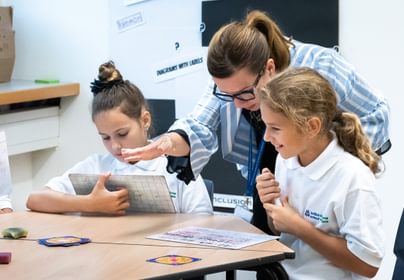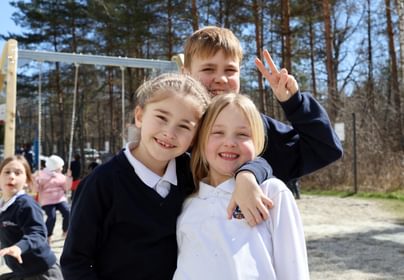Civilisation is the encouragement of differences. No culture can live, if it attempts to be exclusive."Mahatma GandhiBlock Four celebrated Languages, with competitions and initiatives from the MFL staff who worked tirelessly with the students on these. Students presented a Languages quiz to the Secondary school, getting students thinking about our diverse world. Form classes went head to head to be a part of competitions and classes made displays to proudly display on the walls of the school. It was wonderful to see all the students getting so involved and passionate about languages from across the world!
This was also a critical block for the Year 11 to 13 students who sat their mock exams for all subjects. Students received vital feedback from these exams to know what they need to work on to improve. Students will be continually working with teachers and being assessed to get as much feedback as possible before study leave. This busy time of the year always serves as a reminder to all that every year of schooling counts and to always remember those fundamental lessons.
Never underestimate what you are learning now.Our Sixth Form student, Nicholas' words of wisdom to our younger studentsAdditionally, this block, our Year 9and Year 11students had subject information evenings where they had the opportunity to discuss their subject choices at length with their teachers. In the busy school day, often this opportunity does not arise, and it was great to see students taking an avid interest in their options.
Another big highlight of the block were the annual ski trips, organised by Mr Damjan. The students really enjoyed this opportunity to go away with their peers and spend a day skiing in Austria! The sun really shined on these trips and I thank all the staff who attended, to care for our students.
Lastly, students and parents were appreciated a little more than usual this block, with allocated days dedicated to showing our appreciation. Students received a personalised note from the teachers, and parents received kind notes from the students. Little celebrations were held in classes, and a morning with coffee and biscuits was arranged for parents. We extend our appreciation to all the students who push themselves to be the very best they can be, and to the parents who support and assist their children and school every day.
Have a wonderful week break.
Stephanie Andronikos
Head of Secondary
Science Department News
This week we would like to share a couple of pieces written by Yr 9 students, Felix and Uma on the topic of extinction. Congratulations to Anze of Y10A and Shivam of Yr 7 on winning this week’s Science award in recognition of their recent great work.
Mr Cox
Head of Science
MFL News
We are very happy to announce the final winner of the Language competition in Secondary. Tarataratara ..... the winner is Oriol from Y10A. The award was chocolate and 20 house points. Well done!
MFL team
PTA News
The PTA will be selling small donuts (krof) for Pust on 25 February 2020 after lunch. The cost will be 1 euro per donut and children are encouraged to bring exact change.
Student News
Human Impact on Biodiversity and Food Webs
What are Food Webs
The definition of a food web is “a system of interlocking and interdependent food chains”. Most food webs consist of 4 trophic levels; the first trophic level being producers (plants), the second being a primary consumer (typically a small mammal or insect), secondary consumer (normally a small mammal such as a grass snake), tertiary consumers (animals such as weasels, foxes and other small carnivores). Quaternary consumers or apex predators are top predators in food chains. (These are animals with no natural predators like wolves, bears and lions). Decomposers are the end of all trophic levels as they decompose all waste matter and derive their energy the decomposition of all other trophic levels.
How do they affect us?
We rely on many animals for food and each one occupies different spaces in different food webs, and our consumption of them affects each environment in different ways. When one trophic level is disturbed the other levels are then affected. This means that our activities such as the use of pesticides can disrupt food webs. This can have a negative effect on our lifes too, as we consume many animals that are affected by our activities. As we continue to destroy habitats for crops and farmland we don't realize the long term effects.
What is Extinction?
Extinction is when a certain species no longer has any members. A species is considered extinct when there is no way for reproduction to happen between any surviving members. Many species have become extinct as a result of human activity, such as destruction of food sources or their habitats.
Felix
Year 9
Will Koalas Be Extinct in 2021?
Introduction
A koala is a mammal often called a “koala bear” but its not a bear it is a marsupial (wombats, kangaroos, etc.) what they have in common they carry their young ones in pouches.
Currently there are fewer than 100,000 koalas left in the world. Most koalas live in Southeastern and Eastern Australia. Scientists have estimated that the recent Australian BushFires have killed an estimated 20,000 - 30,000 koalas this year.
How are the bushfires endangering Koalas?
Since most koalas live in Australia the fires are killing them and ruining their homes so even if the koala is not killed it doesn't have a home anymore and it will probably die from losing its habitat = no protection.
Will koalas be extinct in 2021?
Currently they are not functionally extinct but the IUCN Red List (Red List of Threatened Species) lists them as ‘Vulnerable’, but that is not a good sign if you ask me.
How can you help prevent koalas from becoming extinct?
This doesn't only apply for koalas but you can help animals just by saving the environment. You can do that by being careful what you throw in the trash, using refillable water bottles that are not plastic, don't always drive - walk or ride a bike and get fresh air. And just by changing little things like that can make a huge difference for climate change and therefore, animals and the environment.
Uma
Year 9
Max's Moment - A Student Perspective
Another week, another segment of ‘Max’s Moment!’
Welcome back everyone. Fortunately, this is the last week before the long-awaited week break! Students in both KS3 and KS4 have been steadily preparing plans for the break, in order to truly relax before our assessments the first 2 weeks back. However, if we compare the duration of our break to the duration of our 6 week block, it is quite evident that the block is considerably longer! It is therefore imperative to maximise the time you have during the week break to truly benefit from the time of school, so that when you come back, you have a weight lifted off your shoulders.
Here are some tips to maximise your break: Time management is key- in order to maximise your break, you have to first understand what you aim to achieve. Keeping an active tab on your goals and or requirements using a diary or journal is essential to substantiate when to do what, and for how long. This will therefore propel the amount of work you have covered and revised for, and thus lead to better results- something everyone strives for. With the extra time of the break in your hands, and a properly exercised time management plan, you can start working earlier and more productively than at school. A 2 year study at Stanford University proved that individuals who worked at home were more productive, tested by a CEO of a company allowing 200 of their employees to work at home in order to save money on office spaces. In retrospect, the study was also exponentially beneficial to the amount of work the employees got done!
Of course, a break is not solely for studying, and making sure you get your well-deserved rest and to catch up on lost sleep is extremely vital to your wellbeing once you arrive back at school. Going to the movies, hanging out with friends and family, and simply chilling at home are all valid ways to spend your time during this break as well!
Year 11, 12 and 13 Ski Trip
We have just received a couple of photos from the year 11,12 and 13 ski trip and would like to quickly share a couple with you. Check out our BISL Sport Instagram page for more content!



